CRED Fintech: Report on the UK Legal System and Business Implications
VerifiedAdded on 2022/04/07
|14
|3154
|28
Report
AI Summary
This report analyzes the impact of the UK legal system on CRED, a fintech company established in 2018. It begins with an overview of the legal system, including civil, common, and theocratic laws, with a focus on the common law system in England and Wales. The report explores the functions of law, the structure of the UK court system, and the differences between civil and criminal law. It then delves into the sources of law, including legislation, common law, and equity, and explains how both statutory and common law apply to CRED. The report includes a case study (McCutheon vs. David MacBrayne Ltd) to illustrate the application of common law. Furthermore, the report examines specific areas of law relevant to CRED, including company law, employment law, and contract law, detailing relevant acts, director's duties, and potential penalties for non-compliance. The report highlights the importance of compliance with regulations such as the Companies Act 2006, the Equality Act 2010, and the Supply of Goods and Services Act 1982, emphasizing how these laws affect CRED's operations and responsibilities. Finally, the report touches upon past legal reforms, such as the Consumer Credit Act 1974.
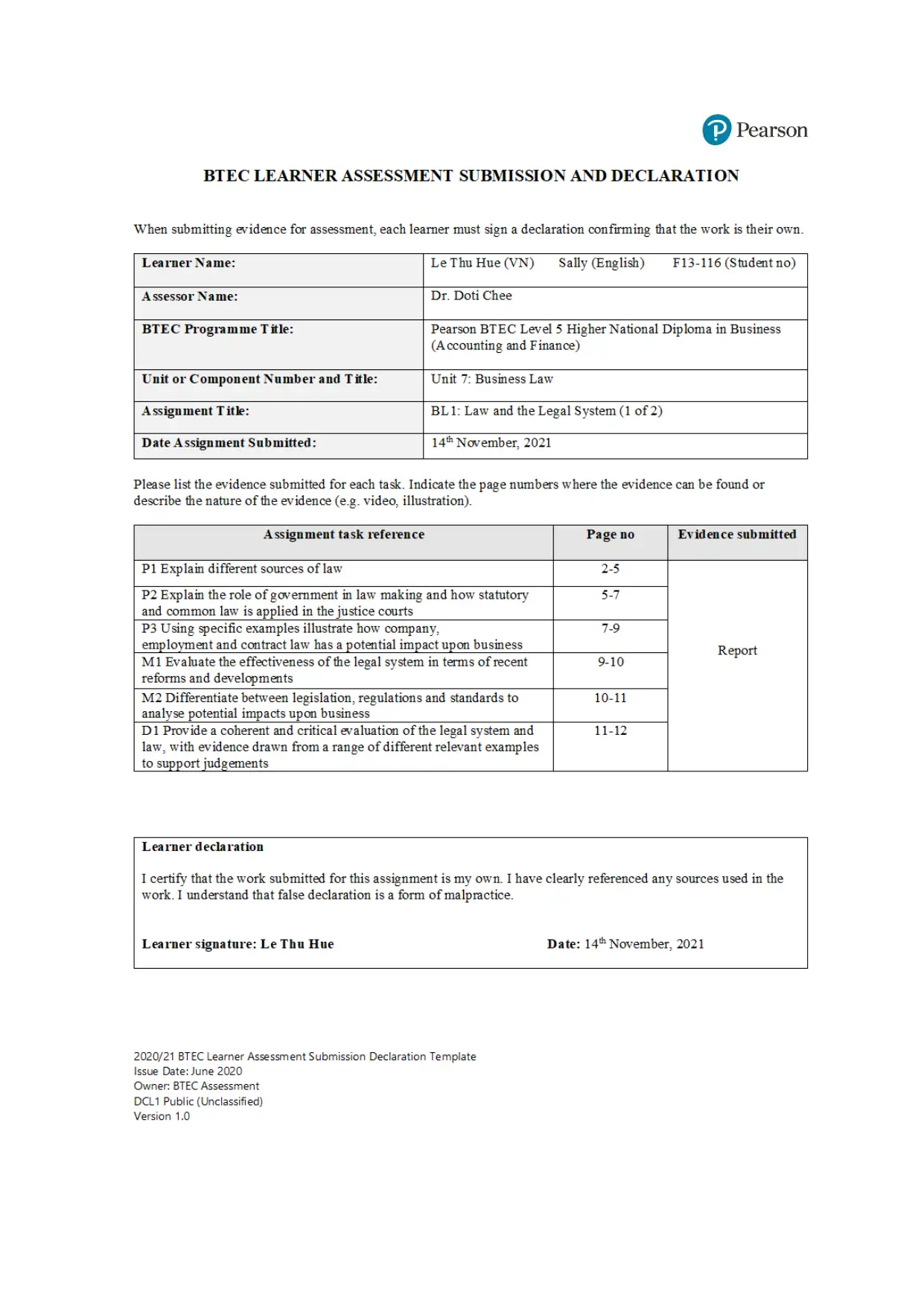
Paraphrase This Document
Need a fresh take? Get an instant paraphrase of this document with our AI Paraphraser
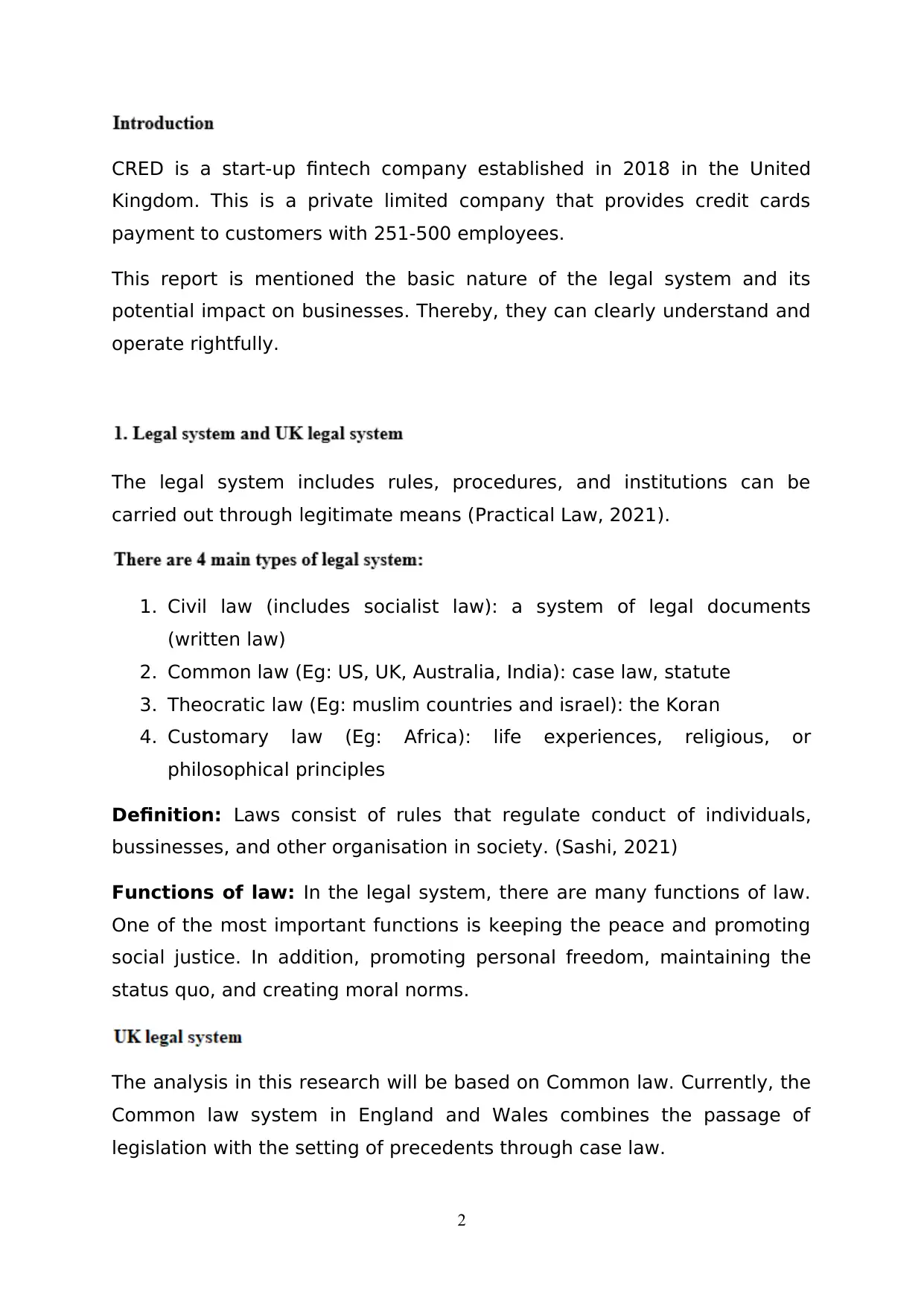
CRED is a start-up fintech company established in 2018 in the United
Kingdom. This is a private limited company that provides credit cards
payment to customers with 251-500 employees.
This report is mentioned the basic nature of the legal system and its
potential impact on businesses. Thereby, they can clearly understand and
operate rightfully.
The legal system includes rules, procedures, and institutions can be
carried out through legitimate means (Practical Law, 2021).
1. Civil law (includes socialist law): a system of legal documents
(written law)
2. Common law (Eg: US, UK, Australia, India): case law, statute
3. Theocratic law (Eg: muslim countries and israel): the Koran
4. Customary law (Eg: Africa): life experiences, religious, or
philosophical principles
Definition: Laws consist of rules that regulate conduct of individuals,
bussinesses, and other organisation in society. (Sashi, 2021)
Functions of law: In the legal system, there are many functions of law.
One of the most important functions is keeping the peace and promoting
social justice. In addition, promoting personal freedom, maintaining the
status quo, and creating moral norms.
The analysis in this research will be based on Common law. Currently, the
Common law system in England and Wales combines the passage of
legislation with the setting of precedents through case law.
2
Kingdom. This is a private limited company that provides credit cards
payment to customers with 251-500 employees.
This report is mentioned the basic nature of the legal system and its
potential impact on businesses. Thereby, they can clearly understand and
operate rightfully.
The legal system includes rules, procedures, and institutions can be
carried out through legitimate means (Practical Law, 2021).
1. Civil law (includes socialist law): a system of legal documents
(written law)
2. Common law (Eg: US, UK, Australia, India): case law, statute
3. Theocratic law (Eg: muslim countries and israel): the Koran
4. Customary law (Eg: Africa): life experiences, religious, or
philosophical principles
Definition: Laws consist of rules that regulate conduct of individuals,
bussinesses, and other organisation in society. (Sashi, 2021)
Functions of law: In the legal system, there are many functions of law.
One of the most important functions is keeping the peace and promoting
social justice. In addition, promoting personal freedom, maintaining the
status quo, and creating moral norms.
The analysis in this research will be based on Common law. Currently, the
Common law system in England and Wales combines the passage of
legislation with the setting of precedents through case law.
2
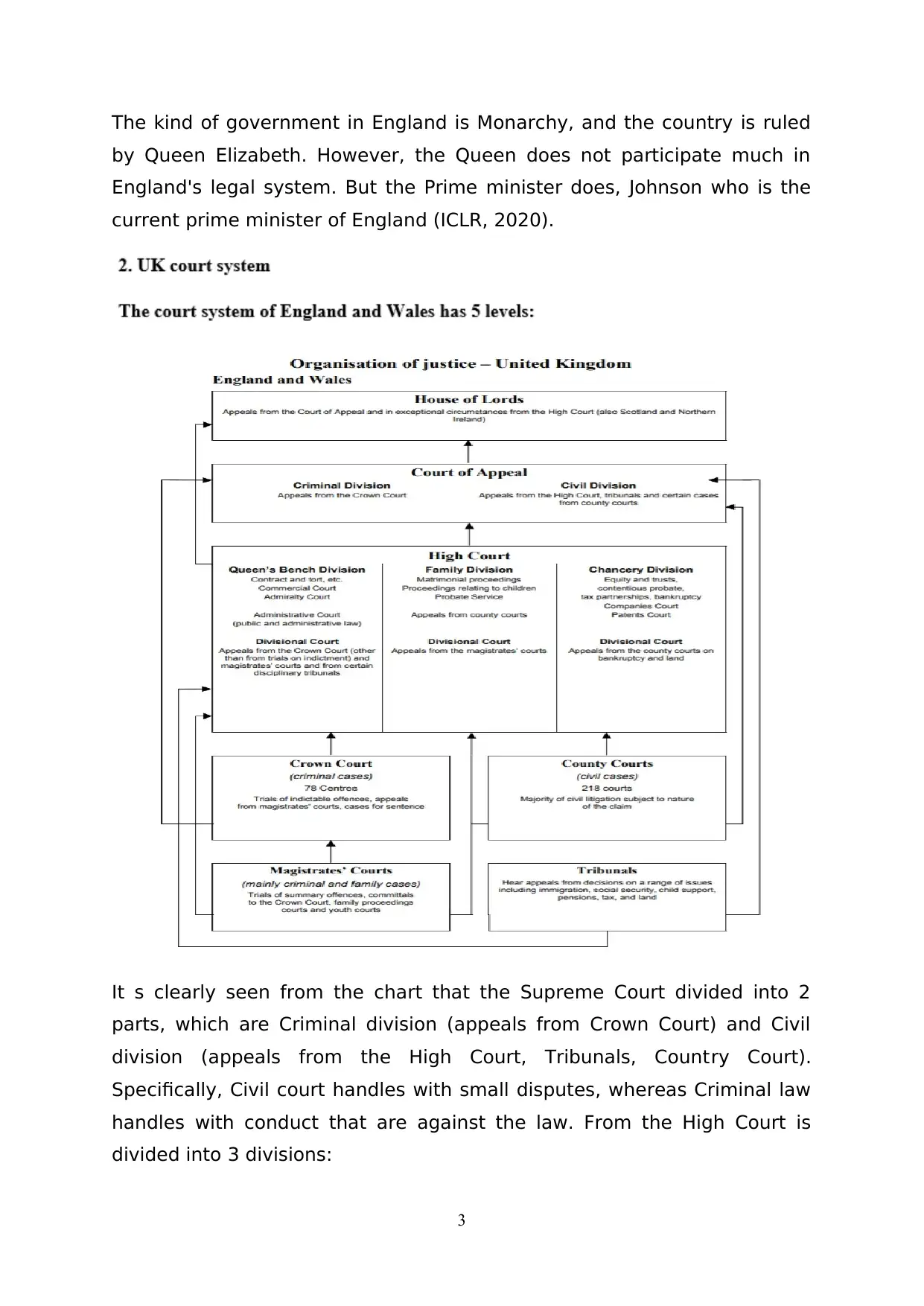
The kind of government in England is Monarchy, and the country is ruled
by Queen Elizabeth. However, the Queen does not participate much in
England's legal system. But the Prime minister does, Johnson who is the
current prime minister of England (ICLR, 2020).
It s clearly seen from the chart that the Supreme Court divided into 2
parts, which are Criminal division (appeals from Crown Court) and Civil
division (appeals from the High Court, Tribunals, Country Court).
Specifically, Civil court handles with small disputes, whereas Criminal law
handles with conduct that are against the law. From the High Court is
divided into 3 divisions:
3
by Queen Elizabeth. However, the Queen does not participate much in
England's legal system. But the Prime minister does, Johnson who is the
current prime minister of England (ICLR, 2020).
It s clearly seen from the chart that the Supreme Court divided into 2
parts, which are Criminal division (appeals from Crown Court) and Civil
division (appeals from the High Court, Tribunals, Country Court).
Specifically, Civil court handles with small disputes, whereas Criminal law
handles with conduct that are against the law. From the High Court is
divided into 3 divisions:
3
⊘ This is a preview!⊘
Do you want full access?
Subscribe today to unlock all pages.

Trusted by 1+ million students worldwide
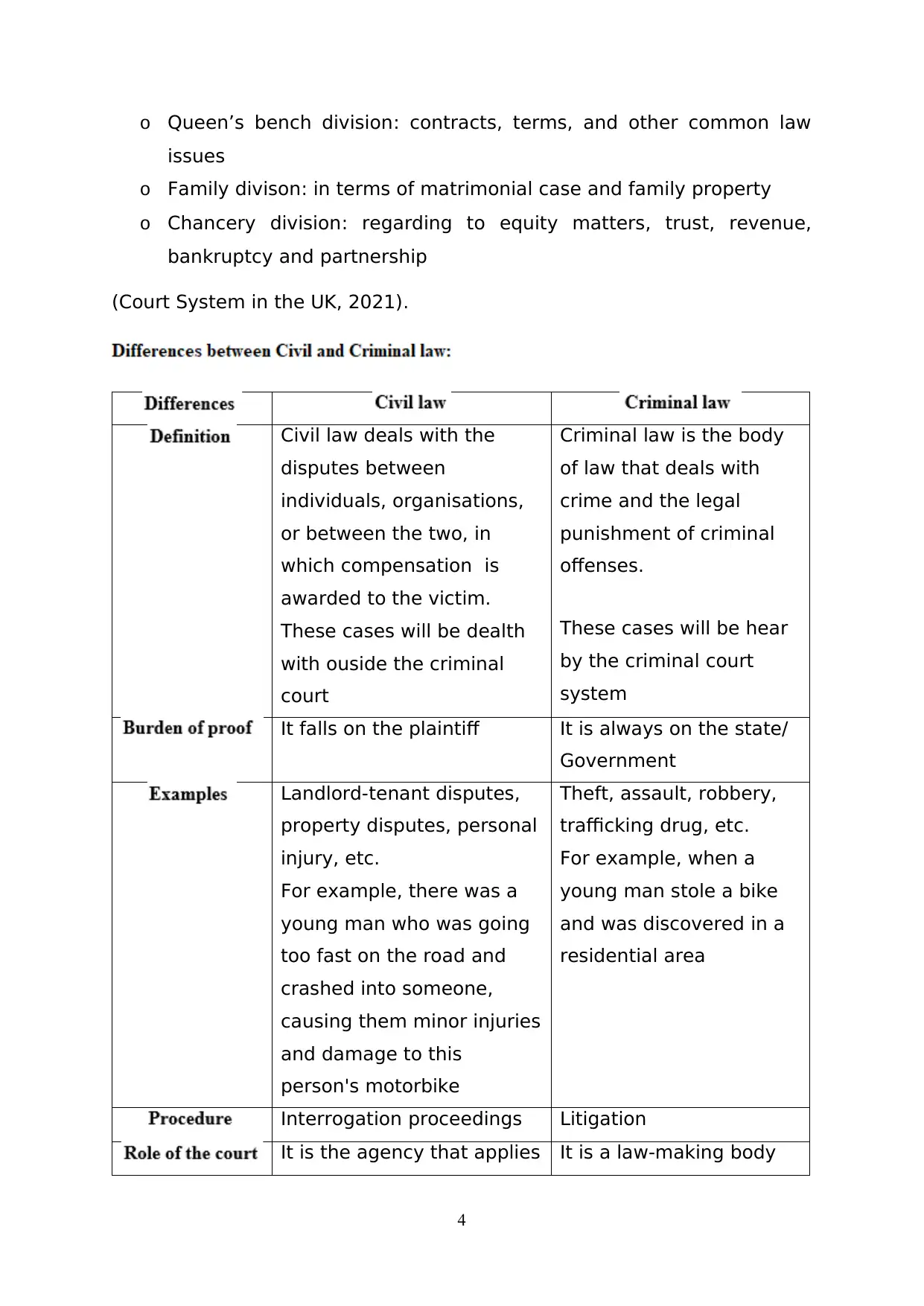
o Queen’s bench division: contracts, terms, and other common law
issues
o Family divison: in terms of matrimonial case and family property
o Chancery division: regarding to equity matters, trust, revenue,
bankruptcy and partnership
(Court System in the UK, 2021).
Civil law deals with the
disputes between
individuals, organisations,
or between the two, in
which compensation is
awarded to the victim.
These cases will be dealth
with ouside the criminal
court
Criminal law is the body
of law that deals with
crime and the legal
punishment of criminal
offenses.
These cases will be hear
by the criminal court
system
It falls on the plaintiff It is always on the state/
Government
Landlord-tenant disputes,
property disputes, personal
injury, etc.
For example, there was a
young man who was going
too fast on the road and
crashed into someone,
causing them minor injuries
and damage to this
person's motorbike
Theft, assault, robbery,
trafficking drug, etc.
For example, when a
young man stole a bike
and was discovered in a
residential area
Interrogation proceedings Litigation
It is the agency that applies It is a law-making body
4
issues
o Family divison: in terms of matrimonial case and family property
o Chancery division: regarding to equity matters, trust, revenue,
bankruptcy and partnership
(Court System in the UK, 2021).
Civil law deals with the
disputes between
individuals, organisations,
or between the two, in
which compensation is
awarded to the victim.
These cases will be dealth
with ouside the criminal
court
Criminal law is the body
of law that deals with
crime and the legal
punishment of criminal
offenses.
These cases will be hear
by the criminal court
system
It falls on the plaintiff It is always on the state/
Government
Landlord-tenant disputes,
property disputes, personal
injury, etc.
For example, there was a
young man who was going
too fast on the road and
crashed into someone,
causing them minor injuries
and damage to this
person's motorbike
Theft, assault, robbery,
trafficking drug, etc.
For example, when a
young man stole a bike
and was discovered in a
residential area
Interrogation proceedings Litigation
It is the agency that applies It is a law-making body
4
Paraphrase This Document
Need a fresh take? Get an instant paraphrase of this document with our AI Paraphraser
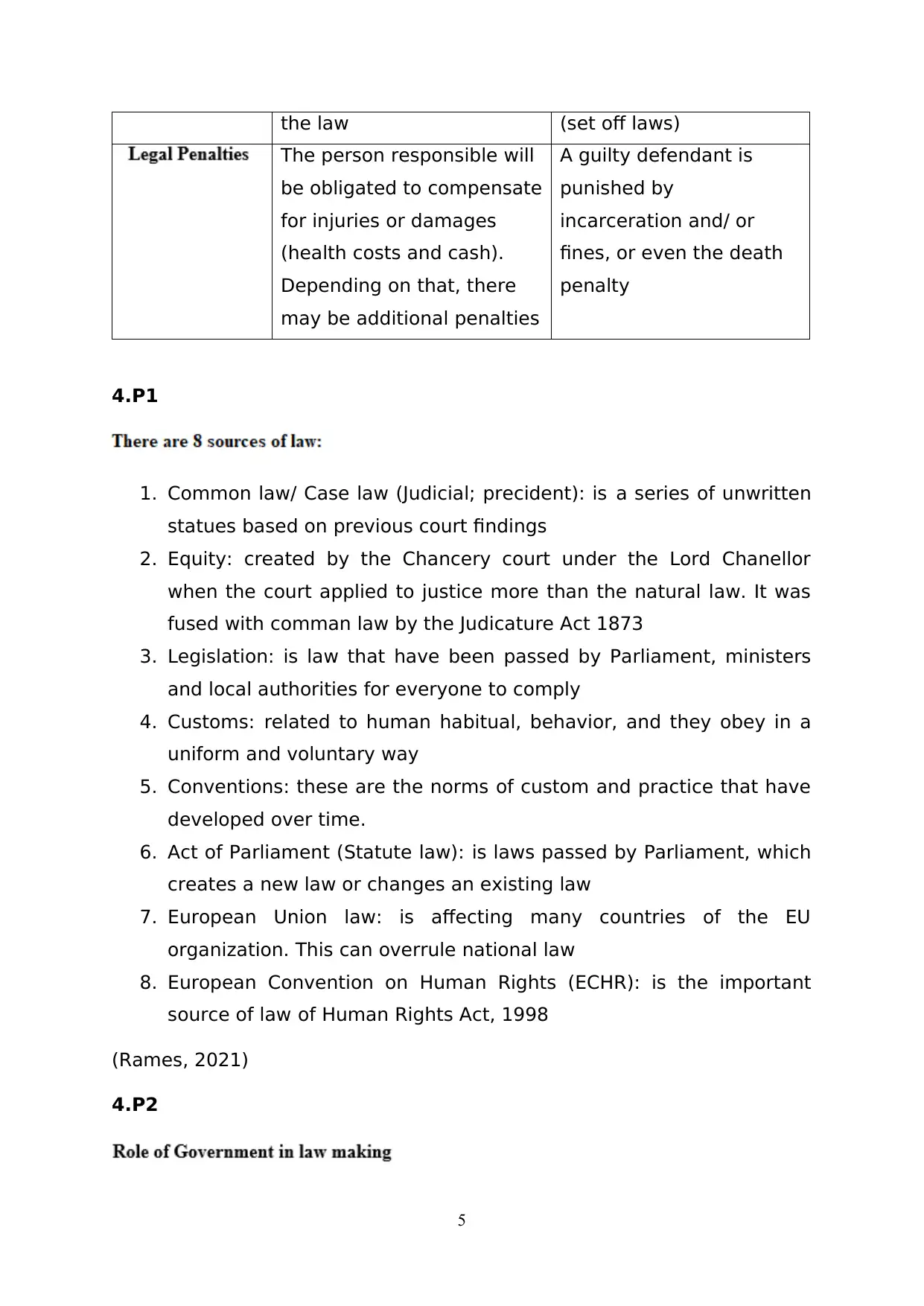
the law (set off laws)
The person responsible will
be obligated to compensate
for injuries or damages
(health costs and cash).
Depending on that, there
may be additional penalties
A guilty defendant is
punished by
incarceration and/ or
fines, or even the death
penalty
4.P1
1. Common law/ Case law (Judicial; precident): is a series of unwritten
statues based on previous court findings
2. Equity: created by the Chancery court under the Lord Chanellor
when the court applied to justice more than the natural law. It was
fused with comman law by the Judicature Act 1873
3. Legislation: is law that have been passed by Parliament, ministers
and local authorities for everyone to comply
4. Customs: related to human habitual, behavior, and they obey in a
uniform and voluntary way
5. Conventions: these are the norms of custom and practice that have
developed over time.
6. Act of Parliament (Statute law): is laws passed by Parliament, which
creates a new law or changes an existing law
7. European Union law: is affecting many countries of the EU
organization. This can overrule national law
8. European Convention on Human Rights (ECHR): is the important
source of law of Human Rights Act, 1998
(Rames, 2021)
4.P2
5
The person responsible will
be obligated to compensate
for injuries or damages
(health costs and cash).
Depending on that, there
may be additional penalties
A guilty defendant is
punished by
incarceration and/ or
fines, or even the death
penalty
4.P1
1. Common law/ Case law (Judicial; precident): is a series of unwritten
statues based on previous court findings
2. Equity: created by the Chancery court under the Lord Chanellor
when the court applied to justice more than the natural law. It was
fused with comman law by the Judicature Act 1873
3. Legislation: is law that have been passed by Parliament, ministers
and local authorities for everyone to comply
4. Customs: related to human habitual, behavior, and they obey in a
uniform and voluntary way
5. Conventions: these are the norms of custom and practice that have
developed over time.
6. Act of Parliament (Statute law): is laws passed by Parliament, which
creates a new law or changes an existing law
7. European Union law: is affecting many countries of the EU
organization. This can overrule national law
8. European Convention on Human Rights (ECHR): is the important
source of law of Human Rights Act, 1998
(Rames, 2021)
4.P2
5
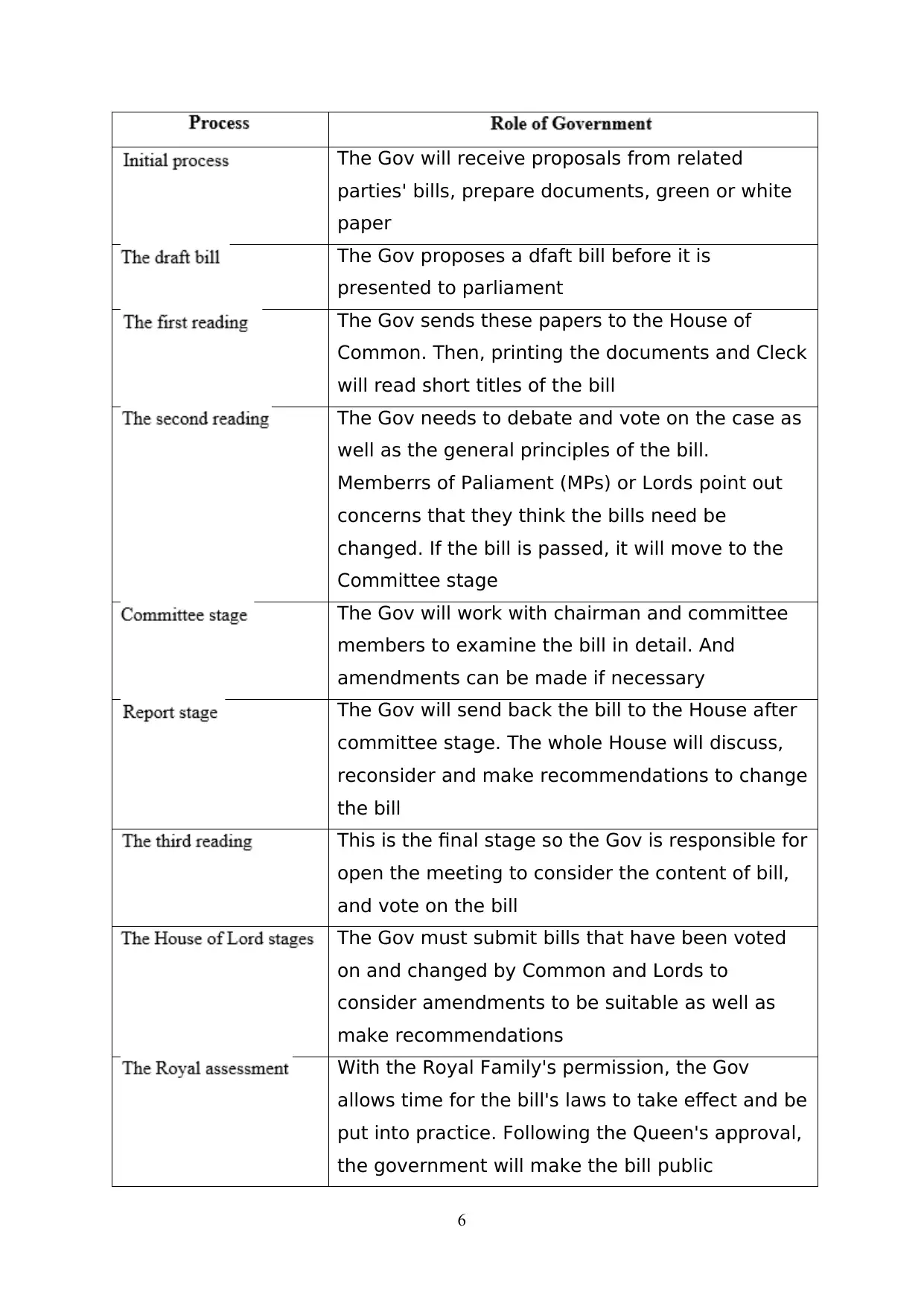
The Gov will receive proposals from related
parties' bills, prepare documents, green or white
paper
The Gov proposes a dfaft bill before it is
presented to parliament
The Gov sends these papers to the House of
Common. Then, printing the documents and Cleck
will read short titles of the bill
The Gov needs to debate and vote on the case as
well as the general principles of the bill.
Memberrs of Paliament (MPs) or Lords point out
concerns that they think the bills need be
changed. If the bill is passed, it will move to the
Committee stage
The Gov will work with chairman and committee
members to examine the bill in detail. And
amendments can be made if necessary
The Gov will send back the bill to the House after
committee stage. The whole House will discuss,
reconsider and make recommendations to change
the bill
This is the final stage so the Gov is responsible for
open the meeting to consider the content of bill,
and vote on the bill
The Gov must submit bills that have been voted
on and changed by Common and Lords to
consider amendments to be suitable as well as
make recommendations
With the Royal Family's permission, the Gov
allows time for the bill's laws to take effect and be
put into practice. Following the Queen's approval,
the government will make the bill public
6
parties' bills, prepare documents, green or white
paper
The Gov proposes a dfaft bill before it is
presented to parliament
The Gov sends these papers to the House of
Common. Then, printing the documents and Cleck
will read short titles of the bill
The Gov needs to debate and vote on the case as
well as the general principles of the bill.
Memberrs of Paliament (MPs) or Lords point out
concerns that they think the bills need be
changed. If the bill is passed, it will move to the
Committee stage
The Gov will work with chairman and committee
members to examine the bill in detail. And
amendments can be made if necessary
The Gov will send back the bill to the House after
committee stage. The whole House will discuss,
reconsider and make recommendations to change
the bill
This is the final stage so the Gov is responsible for
open the meeting to consider the content of bill,
and vote on the bill
The Gov must submit bills that have been voted
on and changed by Common and Lords to
consider amendments to be suitable as well as
make recommendations
With the Royal Family's permission, the Gov
allows time for the bill's laws to take effect and be
put into practice. Following the Queen's approval,
the government will make the bill public
6
⊘ This is a preview!⊘
Do you want full access?
Subscribe today to unlock all pages.

Trusted by 1+ million students worldwide
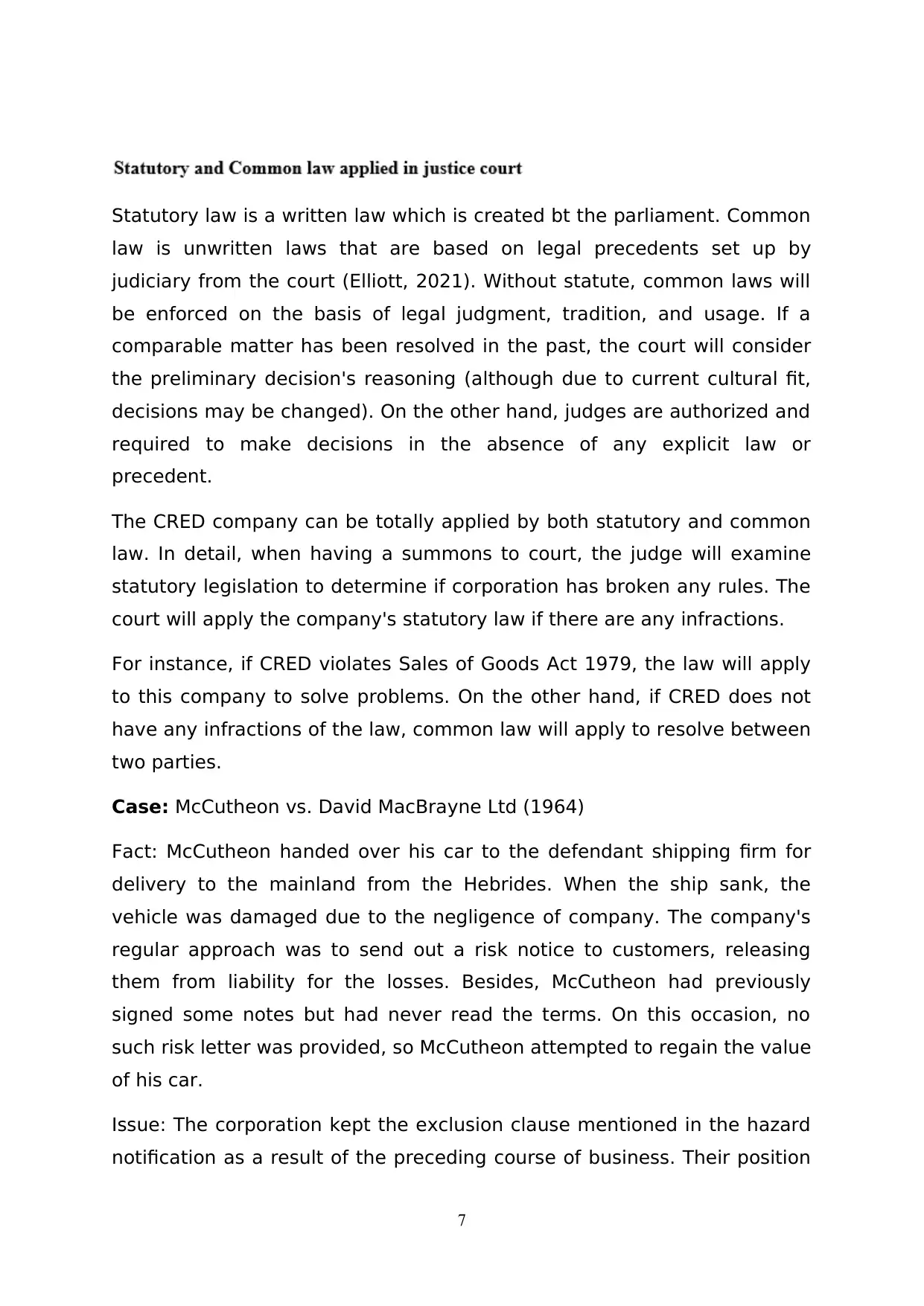
Statutory law is a written law which is created bt the parliament. Common
law is unwritten laws that are based on legal precedents set up by
judiciary from the court (Elliott, 2021). Without statute, common laws will
be enforced on the basis of legal judgment, tradition, and usage. If a
comparable matter has been resolved in the past, the court will consider
the preliminary decision's reasoning (although due to current cultural fit,
decisions may be changed). On the other hand, judges are authorized and
required to make decisions in the absence of any explicit law or
precedent.
The CRED company can be totally applied by both statutory and common
law. In detail, when having a summons to court, the judge will examine
statutory legislation to determine if corporation has broken any rules. The
court will apply the company's statutory law if there are any infractions.
For instance, if CRED violates Sales of Goods Act 1979, the law will apply
to this company to solve problems. On the other hand, if CRED does not
have any infractions of the law, common law will apply to resolve between
two parties.
Case: McCutheon vs. David MacBrayne Ltd (1964)
Fact: McCutheon handed over his car to the defendant shipping firm for
delivery to the mainland from the Hebrides. When the ship sank, the
vehicle was damaged due to the negligence of company. The company's
regular approach was to send out a risk notice to customers, releasing
them from liability for the losses. Besides, McCutheon had previously
signed some notes but had never read the terms. On this occasion, no
such risk letter was provided, so McCutheon attempted to regain the value
of his car.
Issue: The corporation kept the exclusion clause mentioned in the hazard
notification as a result of the preceding course of business. Their position
7
law is unwritten laws that are based on legal precedents set up by
judiciary from the court (Elliott, 2021). Without statute, common laws will
be enforced on the basis of legal judgment, tradition, and usage. If a
comparable matter has been resolved in the past, the court will consider
the preliminary decision's reasoning (although due to current cultural fit,
decisions may be changed). On the other hand, judges are authorized and
required to make decisions in the absence of any explicit law or
precedent.
The CRED company can be totally applied by both statutory and common
law. In detail, when having a summons to court, the judge will examine
statutory legislation to determine if corporation has broken any rules. The
court will apply the company's statutory law if there are any infractions.
For instance, if CRED violates Sales of Goods Act 1979, the law will apply
to this company to solve problems. On the other hand, if CRED does not
have any infractions of the law, common law will apply to resolve between
two parties.
Case: McCutheon vs. David MacBrayne Ltd (1964)
Fact: McCutheon handed over his car to the defendant shipping firm for
delivery to the mainland from the Hebrides. When the ship sank, the
vehicle was damaged due to the negligence of company. The company's
regular approach was to send out a risk notice to customers, releasing
them from liability for the losses. Besides, McCutheon had previously
signed some notes but had never read the terms. On this occasion, no
such risk letter was provided, so McCutheon attempted to regain the value
of his car.
Issue: The corporation kept the exclusion clause mentioned in the hazard
notification as a result of the preceding course of business. Their position
7
Paraphrase This Document
Need a fresh take? Get an instant paraphrase of this document with our AI Paraphraser
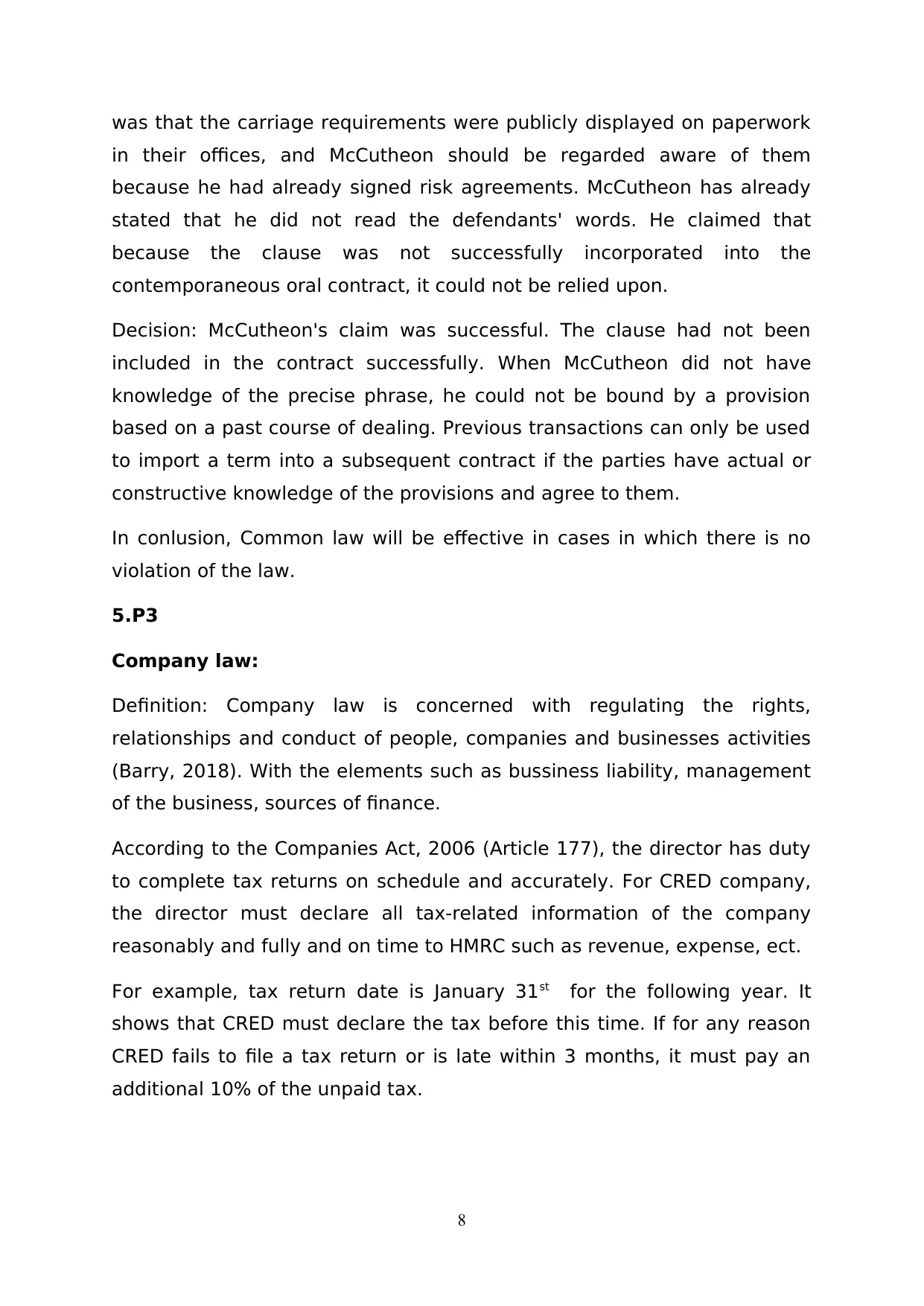
was that the carriage requirements were publicly displayed on paperwork
in their offices, and McCutheon should be regarded aware of them
because he had already signed risk agreements. McCutheon has already
stated that he did not read the defendants' words. He claimed that
because the clause was not successfully incorporated into the
contemporaneous oral contract, it could not be relied upon.
Decision: McCutheon's claim was successful. The clause had not been
included in the contract successfully. When McCutheon did not have
knowledge of the precise phrase, he could not be bound by a provision
based on a past course of dealing. Previous transactions can only be used
to import a term into a subsequent contract if the parties have actual or
constructive knowledge of the provisions and agree to them.
In conlusion, Common law will be effective in cases in which there is no
violation of the law.
5.P3
Company law:
Definition: Company law is concerned with regulating the rights,
relationships and conduct of people, companies and businesses activities
(Barry, 2018). With the elements such as bussiness liability, management
of the business, sources of finance.
According to the Companies Act, 2006 (Article 177), the director has duty
to complete tax returns on schedule and accurately. For CRED company,
the director must declare all tax-related information of the company
reasonably and fully and on time to HMRC such as revenue, expense, ect.
For example, tax return date is January 31st for the following year. It
shows that CRED must declare the tax before this time. If for any reason
CRED fails to file a tax return or is late within 3 months, it must pay an
additional 10% of the unpaid tax.
8
in their offices, and McCutheon should be regarded aware of them
because he had already signed risk agreements. McCutheon has already
stated that he did not read the defendants' words. He claimed that
because the clause was not successfully incorporated into the
contemporaneous oral contract, it could not be relied upon.
Decision: McCutheon's claim was successful. The clause had not been
included in the contract successfully. When McCutheon did not have
knowledge of the precise phrase, he could not be bound by a provision
based on a past course of dealing. Previous transactions can only be used
to import a term into a subsequent contract if the parties have actual or
constructive knowledge of the provisions and agree to them.
In conlusion, Common law will be effective in cases in which there is no
violation of the law.
5.P3
Company law:
Definition: Company law is concerned with regulating the rights,
relationships and conduct of people, companies and businesses activities
(Barry, 2018). With the elements such as bussiness liability, management
of the business, sources of finance.
According to the Companies Act, 2006 (Article 177), the director has duty
to complete tax returns on schedule and accurately. For CRED company,
the director must declare all tax-related information of the company
reasonably and fully and on time to HMRC such as revenue, expense, ect.
For example, tax return date is January 31st for the following year. It
shows that CRED must declare the tax before this time. If for any reason
CRED fails to file a tax return or is late within 3 months, it must pay an
additional 10% of the unpaid tax.
8
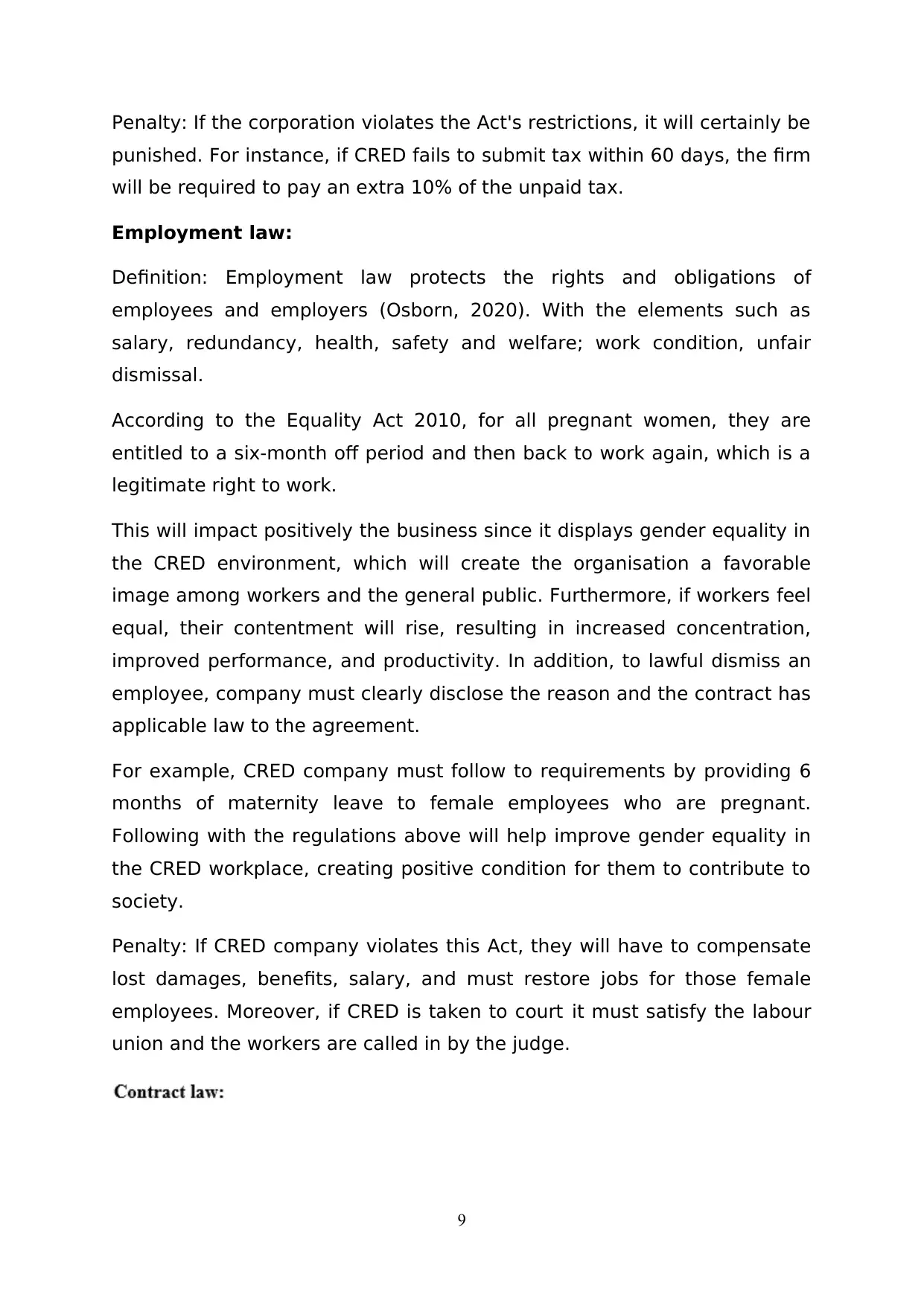
Penalty: If the corporation violates the Act's restrictions, it will certainly be
punished. For instance, if CRED fails to submit tax within 60 days, the firm
will be required to pay an extra 10% of the unpaid tax.
Employment law:
Definition: Employment law protects the rights and obligations of
employees and employers (Osborn, 2020). With the elements such as
salary, redundancy, health, safety and welfare; work condition, unfair
dismissal.
According to the Equality Act 2010, for all pregnant women, they are
entitled to a six-month off period and then back to work again, which is a
legitimate right to work.
This will impact positively the business since it displays gender equality in
the CRED environment, which will create the organisation a favorable
image among workers and the general public. Furthermore, if workers feel
equal, their contentment will rise, resulting in increased concentration,
improved performance, and productivity. In addition, to lawful dismiss an
employee, company must clearly disclose the reason and the contract has
applicable law to the agreement.
For example, CRED company must follow to requirements by providing 6
months of maternity leave to female employees who are pregnant.
Following with the regulations above will help improve gender equality in
the CRED workplace, creating positive condition for them to contribute to
society.
Penalty: If CRED company violates this Act, they will have to compensate
lost damages, benefits, salary, and must restore jobs for those female
employees. Moreover, if CRED is taken to court it must satisfy the labour
union and the workers are called in by the judge.
9
punished. For instance, if CRED fails to submit tax within 60 days, the firm
will be required to pay an extra 10% of the unpaid tax.
Employment law:
Definition: Employment law protects the rights and obligations of
employees and employers (Osborn, 2020). With the elements such as
salary, redundancy, health, safety and welfare; work condition, unfair
dismissal.
According to the Equality Act 2010, for all pregnant women, they are
entitled to a six-month off period and then back to work again, which is a
legitimate right to work.
This will impact positively the business since it displays gender equality in
the CRED environment, which will create the organisation a favorable
image among workers and the general public. Furthermore, if workers feel
equal, their contentment will rise, resulting in increased concentration,
improved performance, and productivity. In addition, to lawful dismiss an
employee, company must clearly disclose the reason and the contract has
applicable law to the agreement.
For example, CRED company must follow to requirements by providing 6
months of maternity leave to female employees who are pregnant.
Following with the regulations above will help improve gender equality in
the CRED workplace, creating positive condition for them to contribute to
society.
Penalty: If CRED company violates this Act, they will have to compensate
lost damages, benefits, salary, and must restore jobs for those female
employees. Moreover, if CRED is taken to court it must satisfy the labour
union and the workers are called in by the judge.
9
⊘ This is a preview!⊘
Do you want full access?
Subscribe today to unlock all pages.

Trusted by 1+ million students worldwide
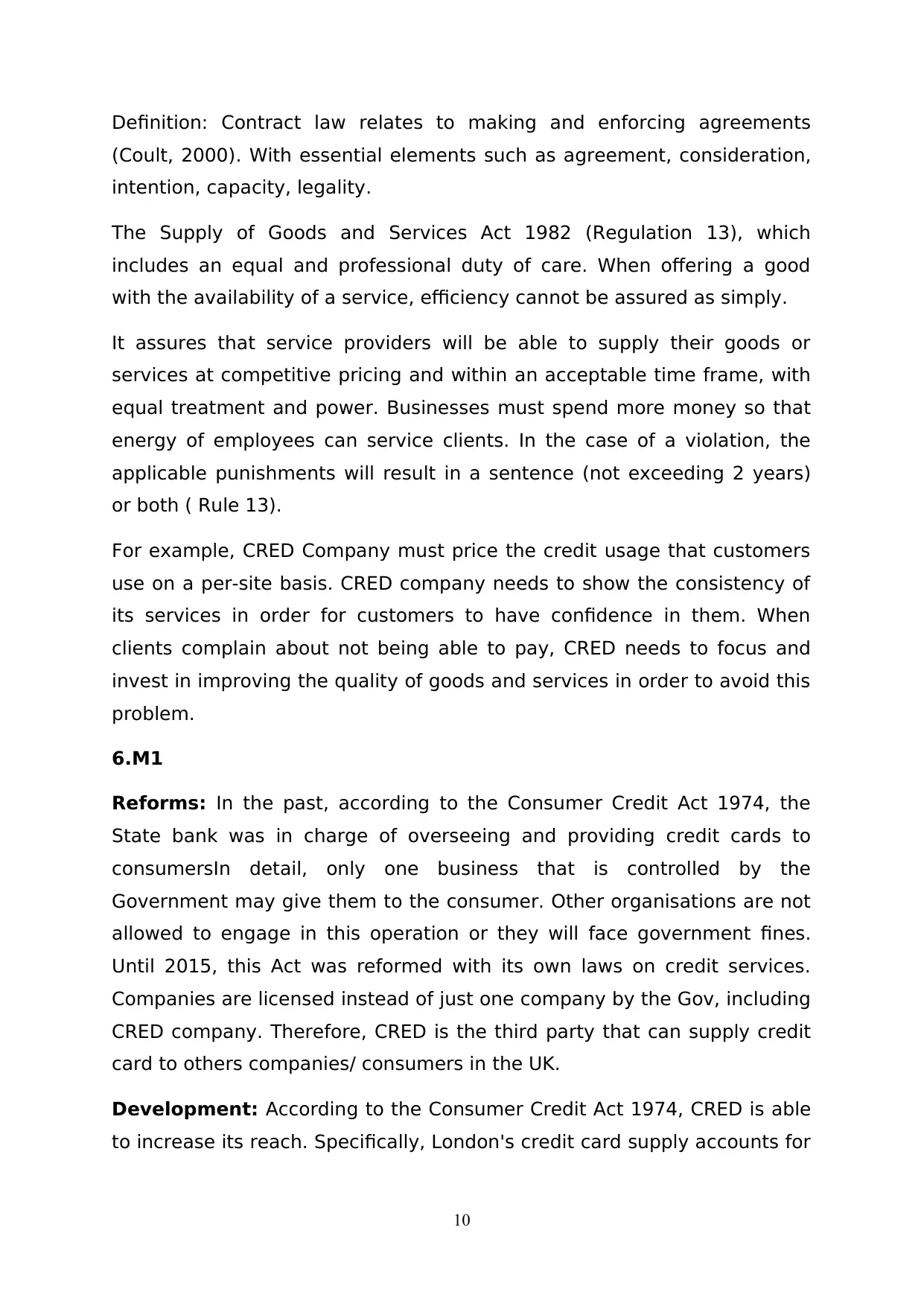
Definition: Contract law relates to making and enforcing agreements
(Coult, 2000). With essential elements such as agreement, consideration,
intention, capacity, legality.
The Supply of Goods and Services Act 1982 (Regulation 13), which
includes an equal and professional duty of care. When offering a good
with the availability of a service, efficiency cannot be assured as simply.
It assures that service providers will be able to supply their goods or
services at competitive pricing and within an acceptable time frame, with
equal treatment and power. Businesses must spend more money so that
energy of employees can service clients. In the case of a violation, the
applicable punishments will result in a sentence (not exceeding 2 years)
or both ( Rule 13).
For example, CRED Company must price the credit usage that customers
use on a per-site basis. CRED company needs to show the consistency of
its services in order for customers to have confidence in them. When
clients complain about not being able to pay, CRED needs to focus and
invest in improving the quality of goods and services in order to avoid this
problem.
6.M1
Reforms: In the past, according to the Consumer Credit Act 1974, the
State bank was in charge of overseeing and providing credit cards to
consumersIn detail, only one business that is controlled by the
Government may give them to the consumer. Other organisations are not
allowed to engage in this operation or they will face government fines.
Until 2015, this Act was reformed with its own laws on credit services.
Companies are licensed instead of just one company by the Gov, including
CRED company. Therefore, CRED is the third party that can supply credit
card to others companies/ consumers in the UK.
Development: According to the Consumer Credit Act 1974, CRED is able
to increase its reach. Specifically, London's credit card supply accounts for
10
(Coult, 2000). With essential elements such as agreement, consideration,
intention, capacity, legality.
The Supply of Goods and Services Act 1982 (Regulation 13), which
includes an equal and professional duty of care. When offering a good
with the availability of a service, efficiency cannot be assured as simply.
It assures that service providers will be able to supply their goods or
services at competitive pricing and within an acceptable time frame, with
equal treatment and power. Businesses must spend more money so that
energy of employees can service clients. In the case of a violation, the
applicable punishments will result in a sentence (not exceeding 2 years)
or both ( Rule 13).
For example, CRED Company must price the credit usage that customers
use on a per-site basis. CRED company needs to show the consistency of
its services in order for customers to have confidence in them. When
clients complain about not being able to pay, CRED needs to focus and
invest in improving the quality of goods and services in order to avoid this
problem.
6.M1
Reforms: In the past, according to the Consumer Credit Act 1974, the
State bank was in charge of overseeing and providing credit cards to
consumersIn detail, only one business that is controlled by the
Government may give them to the consumer. Other organisations are not
allowed to engage in this operation or they will face government fines.
Until 2015, this Act was reformed with its own laws on credit services.
Companies are licensed instead of just one company by the Gov, including
CRED company. Therefore, CRED is the third party that can supply credit
card to others companies/ consumers in the UK.
Development: According to the Consumer Credit Act 1974, CRED is able
to increase its reach. Specifically, London's credit card supply accounts for
10
Paraphrase This Document
Need a fresh take? Get an instant paraphrase of this document with our AI Paraphraser
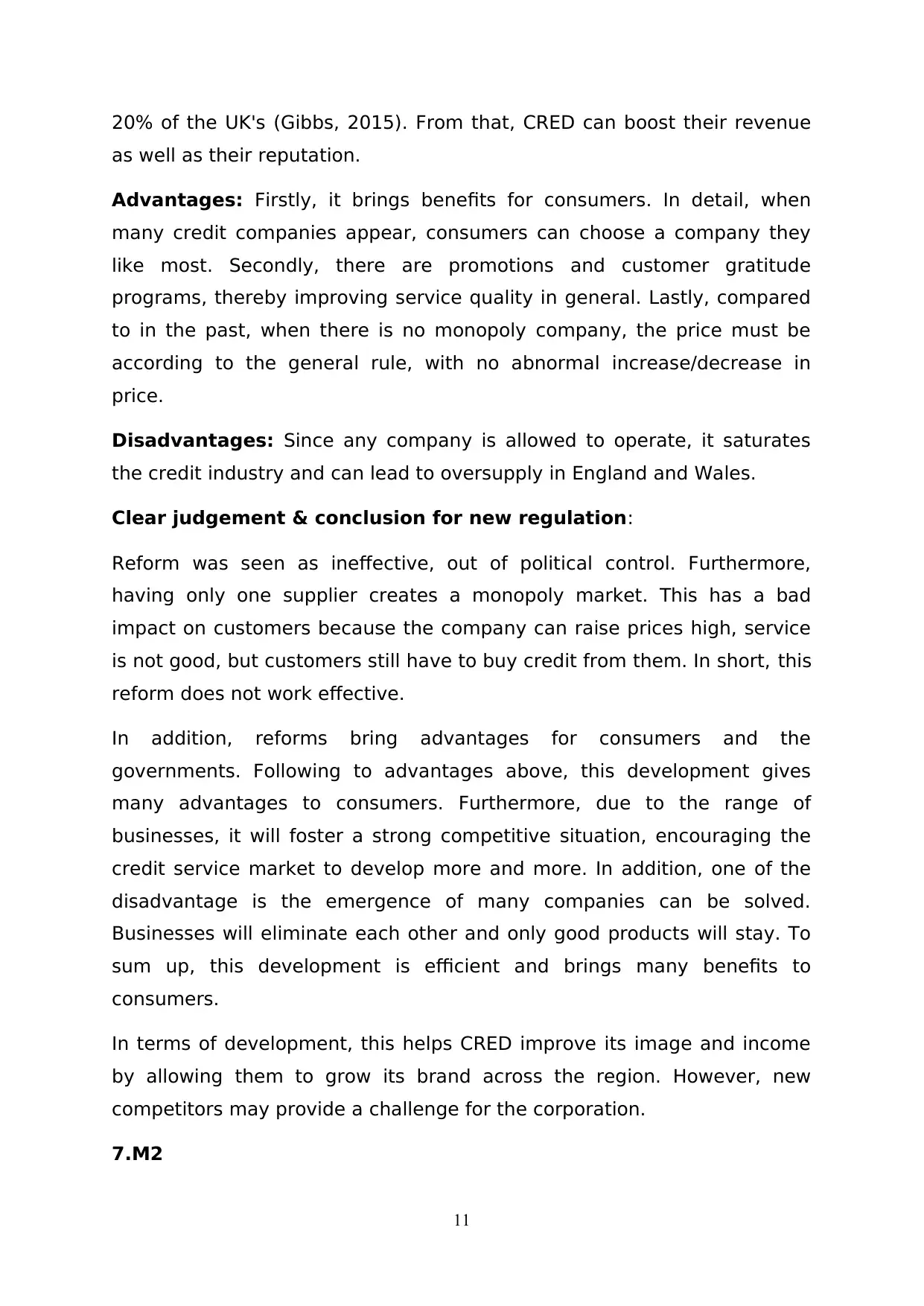
20% of the UK's (Gibbs, 2015). From that, CRED can boost their revenue
as well as their reputation.
Advantages: Firstly, it brings benefits for consumers. In detail, when
many credit companies appear, consumers can choose a company they
like most. Secondly, there are promotions and customer gratitude
programs, thereby improving service quality in general. Lastly, compared
to in the past, when there is no monopoly company, the price must be
according to the general rule, with no abnormal increase/decrease in
price.
Disadvantages: Since any company is allowed to operate, it saturates
the credit industry and can lead to oversupply in England and Wales.
Clear judgement & conclusion for new regulation:
Reform was seen as ineffective, out of political control. Furthermore,
having only one supplier creates a monopoly market. This has a bad
impact on customers because the company can raise prices high, service
is not good, but customers still have to buy credit from them. In short, this
reform does not work effective.
In addition, reforms bring advantages for consumers and the
governments. Following to advantages above, this development gives
many advantages to consumers. Furthermore, due to the range of
businesses, it will foster a strong competitive situation, encouraging the
credit service market to develop more and more. In addition, one of the
disadvantage is the emergence of many companies can be solved.
Businesses will eliminate each other and only good products will stay. To
sum up, this development is efficient and brings many benefits to
consumers.
In terms of development, this helps CRED improve its image and income
by allowing them to grow its brand across the region. However, new
competitors may provide a challenge for the corporation.
7.M2
11
as well as their reputation.
Advantages: Firstly, it brings benefits for consumers. In detail, when
many credit companies appear, consumers can choose a company they
like most. Secondly, there are promotions and customer gratitude
programs, thereby improving service quality in general. Lastly, compared
to in the past, when there is no monopoly company, the price must be
according to the general rule, with no abnormal increase/decrease in
price.
Disadvantages: Since any company is allowed to operate, it saturates
the credit industry and can lead to oversupply in England and Wales.
Clear judgement & conclusion for new regulation:
Reform was seen as ineffective, out of political control. Furthermore,
having only one supplier creates a monopoly market. This has a bad
impact on customers because the company can raise prices high, service
is not good, but customers still have to buy credit from them. In short, this
reform does not work effective.
In addition, reforms bring advantages for consumers and the
governments. Following to advantages above, this development gives
many advantages to consumers. Furthermore, due to the range of
businesses, it will foster a strong competitive situation, encouraging the
credit service market to develop more and more. In addition, one of the
disadvantage is the emergence of many companies can be solved.
Businesses will eliminate each other and only good products will stay. To
sum up, this development is efficient and brings many benefits to
consumers.
In terms of development, this helps CRED improve its image and income
by allowing them to grow its brand across the region. However, new
competitors may provide a challenge for the corporation.
7.M2
11
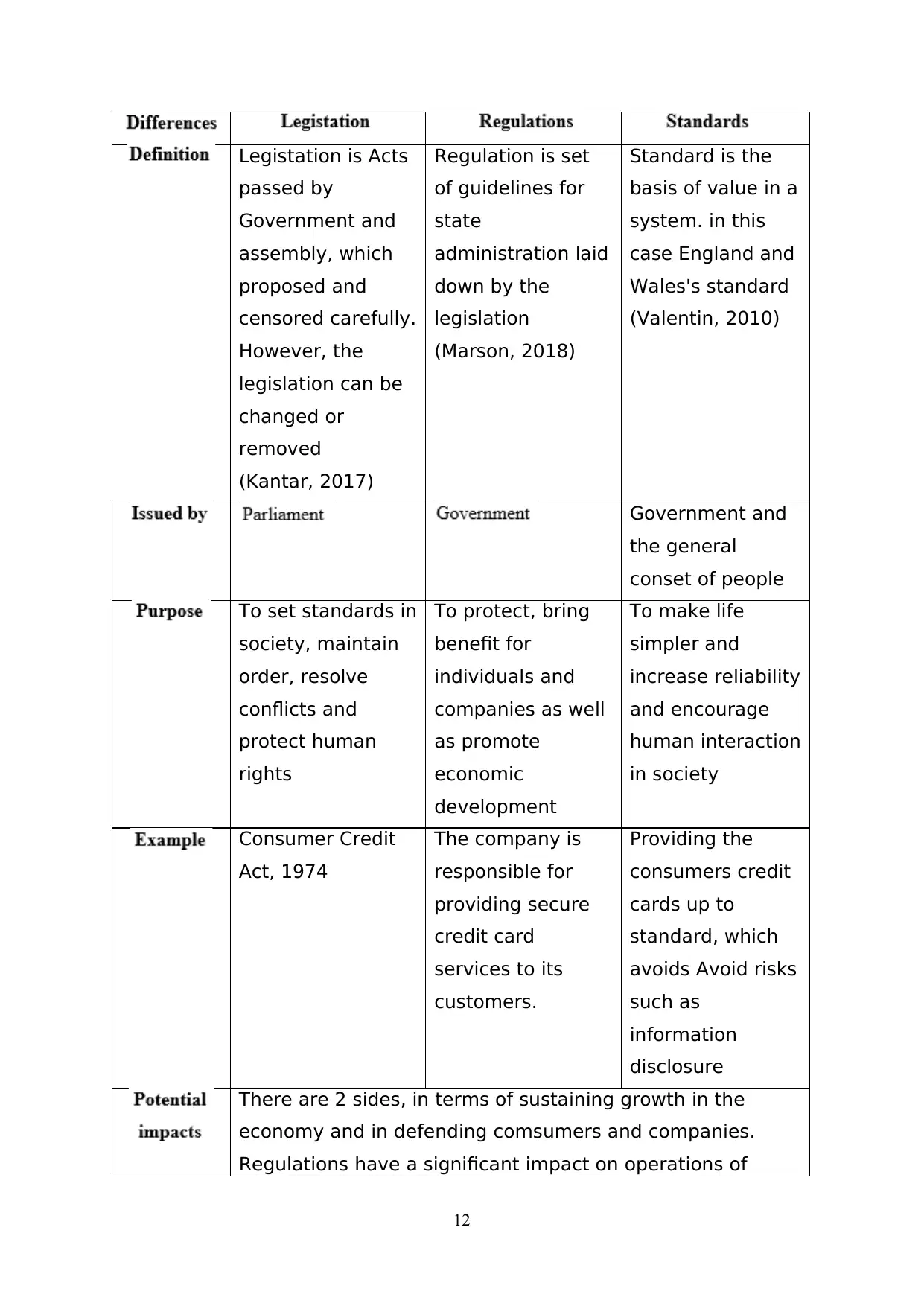
Legistation is Acts
passed by
Government and
assembly, which
proposed and
censored carefully.
However, the
legislation can be
changed or
removed
(Kantar, 2017)
Regulation is set
of guidelines for
state
administration laid
down by the
legislation
(Marson, 2018)
Standard is the
basis of value in a
system. in this
case England and
Wales's standard
(Valentin, 2010)
Government and
the general
conset of people
To set standards in
society, maintain
order, resolve
conflicts and
protect human
rights
To protect, bring
benefit for
individuals and
companies as well
as promote
economic
development
To make life
simpler and
increase reliability
and encourage
human interaction
in society
Consumer Credit
Act, 1974
The company is
responsible for
providing secure
credit card
services to its
customers.
Providing the
consumers credit
cards up to
standard, which
avoids Avoid risks
such as
information
disclosure
There are 2 sides, in terms of sustaining growth in the
economy and in defending comsumers and companies.
Regulations have a significant impact on operations of
12
passed by
Government and
assembly, which
proposed and
censored carefully.
However, the
legislation can be
changed or
removed
(Kantar, 2017)
Regulation is set
of guidelines for
state
administration laid
down by the
legislation
(Marson, 2018)
Standard is the
basis of value in a
system. in this
case England and
Wales's standard
(Valentin, 2010)
Government and
the general
conset of people
To set standards in
society, maintain
order, resolve
conflicts and
protect human
rights
To protect, bring
benefit for
individuals and
companies as well
as promote
economic
development
To make life
simpler and
increase reliability
and encourage
human interaction
in society
Consumer Credit
Act, 1974
The company is
responsible for
providing secure
credit card
services to its
customers.
Providing the
consumers credit
cards up to
standard, which
avoids Avoid risks
such as
information
disclosure
There are 2 sides, in terms of sustaining growth in the
economy and in defending comsumers and companies.
Regulations have a significant impact on operations of
12
⊘ This is a preview!⊘
Do you want full access?
Subscribe today to unlock all pages.

Trusted by 1+ million students worldwide
1 out of 14
Related Documents
Your All-in-One AI-Powered Toolkit for Academic Success.
+13062052269
info@desklib.com
Available 24*7 on WhatsApp / Email
![[object Object]](/_next/static/media/star-bottom.7253800d.svg)
Unlock your academic potential
Copyright © 2020–2026 A2Z Services. All Rights Reserved. Developed and managed by ZUCOL.





